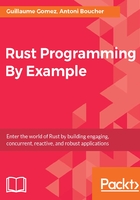
Test your installation
Let's try to build a Rust program. First, create a new project with cargo:
$ cargo new --bin hello_world Created binary (application) `hello_world` project
The --bin flag indicates that we want to create an executable project, as opposed to a library (which is the default without this flag). In the Rust world, a crate is a package of libraries and/or executable binaries.
This created a hello_world directory containing the following files and directory:
$ tree hello_world/ hello_world/ ├── Cargo.toml └── src └── main.rs 1 directory, 2 files
The Cargo.toml file is where the metadata (name, version, and so on) of your project resides, as well as its dependencies. The source files of your project are in the src directory. It's now time to run this project:
$ cd hello_world/ $ cargo run Compiling hello_world v0.1.0 (file:///home/packtpub/projects/hello_world) Finished dev [unoptimized + debuginfo] target(s) in 0.39 secs Running `target/debug/hello_world` Hello, world!
The first three lines printed after cargo run are lines printed by cargo indicating what it did: it compiled the project and ran it. The last line, Hello, world!, is the line printed by our project. As you can see, cargo generates a Rust file that prints text to stdout (standard output):
$ cat src/main.rs fn main() { println!("Hello, world!"); }
If you only want to compile the project without running it, type the following instead:
$ cargo build Finished dev [unoptimized + debuginfo] target(s) in 0.0 secs
This time, we didn't see Compiling hello_world because cargo did not see any changes to the project's files, thus, there's no need to compile again.